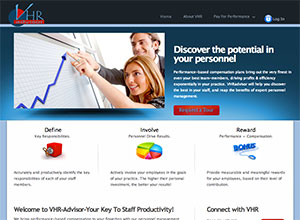 |
|
Setting Up a Performance-Based Compensation Program
A new web-based program,
VHR-Advisor, makes setting up performance-based compensation easy. This program will:
-
Accurately and productively identify the key responsibilities of each staff member.
-
Actively involve your employees in the goals of your practice. The higher their personal investment, the better your results.
-
Provide measurable and meaningful rewards for your employees, based on their level of contribution.
|
Are you struggling with annual reviews and employees who feel entitled to a pay raise every year, regardless of their performance? Is each staff member clear about the things they do that have the greatest impact on profitability? Is it becoming increasingly more difficult to keep up with employee reviews as you add more locations and your staff grows larger? Do you find it difficult to provide constructive feedback?
If just one, two or all of these challenges are true for your business, consider implementing performance-based compensation to overcome them. Here are four steps you can take to stop entitlement raises, provide job clarity, motivate employees and take the dread out of review time:
1. Determine your overall goal.
You have to know where you are going in order to get there! Your staff must understand this as well. Stating a yearly production number or percentage increase is not enough. Imagine a beginning dart player who has a goal to hit the bull's-eye. Of course, there is a remote chance they will get lucky and hit it, but it is not likely. Hitting the bull's-eye requires focus, practice and precision. Similarly, getting to your overall goal requires focus, practice and precision.
Once the yearly goal has been set, break it up into months or quarters to gain greater focus. Break it down even further by location. Next, set up scoreboards in staff lunch rooms that continually remind everyone of what the goal is and how close you are to meeting it.
2. Clearly articulate and document the role each person has in meeting the goal.
Each team member needs to clearly understand their unique role and accountabilities toward meeting your goal. There are five areas of accountability that each employee has:
- Expertise
- Profitability
- Customer service
- Teamwork
- Housekeeping
By giving precise direction to each employee, the chances of achieving your goal greatly improve. Ask your employees to create a worksheet with these five categories and then refine it with them. When someone is involved in their own review system their buy-in increases tenfold.
3. Measure and manage performance.
Every role should have a success measurement tied to it. In other words, staff members need to understand what is expected of them and what represents a home run and a win. Managers need to schedule quarterly one-on-one time with their direct reports to stay on track. During this time, each employee should be rated on their personal goals, using the following scale:
Rate on a scale of 1 to 4:
1 = barely getting by
2 = meets expectations
3 = exceeds expectations
4 = clearly outstanding
The majority of employees will be in the 2.3 to 3.0 rating. These quarterly one-on-one meetings give the manager a chance to encourage an employee who rates high and to coach an employee with a lower rating.
During the meeting, discuss each area of accountability, where they are succeeding and where they need improvement. What could they do to get that 2 up to a 3 next time? As they prosper so does the business, so find out if they need any additional training or resources to help them accomplish their goals.
4. Align raises and bonuses directly to performance ratings.
This is where entitlement compensation ends and performance-based compensation begins. A pay increase is not given just because an employee has shown up to work. Pay increases should be tied directly to the ratings and only given when the goal is met. By aligning raises and bonuses to individual ratings, you are ensuring that each employee receives fair compensation based on their participation toward meeting the overall goal.
Employees who are part of a performance-based compensation program find higher job satisfaction because raises and bonuses are not a surprise. Many feel that depending on the doctor's mood determines their compensation. Instead, performance-based compensation creates a positive environment to reward success.
Jay Binkowitz, optometric business consultant, is chief executive officer and president of
GPN, exclusive provider of The EDGE.
Evan Kestenbaum, MBA, is chief information officer of
GPN, Exclusive Provider of The EDGE. Contact Jay and Evan directly at
clientservices.gpn@gmail.com.
Rebecca Johnson, CPOT, COT, COE, is the executive director, business consultative services, for GPN, and managing director, VHR-Advisor.